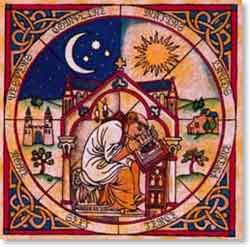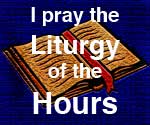[et_pb_section admin_label=”section”]
[et_pb_row admin_label=”row”]
[et_pb_column type=”4_4″][et_pb_text admin_label=”Text”] The Liturgy of the Hours, or Daily office, Prayer of the Church, breviary, Daily Prayer, or Opus Dei (the work of God) – these are various titles for which this page will become a reference and resource.
The Liturgy of the Hours, or Daily office, Prayer of the Church, breviary, Daily Prayer, or Opus Dei (the work of God) – these are various titles for which this page will become a reference and resource.
Many resources for praying the Liturgy of the Hours are to be found in this site’s virtual chapel.
Another source: including an RSS feed for the Daily Office (link off this site)
Getting started
The Liturgy of the Hours can appear quite foreign if you have never picked this tradition of praying up previously. Here is a simple introduction to get one started.
Encouraging others
Encourage the practice of praying the Liturgy of the Hours from your blog or website.
Add this badge to your blog or website to encourage praying the Liturgy of the Hours – including ecumenically:
Use the following HTML:
Alternative options: for a community site, “Daily Office”, etc.
Reviews of different versions of the Liturgy of the Hours
Currently this is the starting point for finding reviews of different versions of the Liturgy of the Hours. These reviews will be added to (this site’s RSS feed is one way to keep in touch with developments).
Where can I find out more about the Liturgy of the Hours online?
Most recent review: Camaldolese Office Book: Lauds and Vespers
Renewal of the Liturgy of the Hours
This site is committed to the increased use of the Liturgy of the Hours by the whole people of God. But there is a consciousness of the particular association of this tradition with monastic spirituality.
This site is also committed to helping the renewal of the understanding of the Liturgy of the Hours – from merely one other form of personal spiritual discipline amongst many – to the growing realisation that this is the “prayer of the church” – of us all – the whole church; a communal discipline and practice into which we enter (even when alone), and by entering this essentially communal practice we grow spiritually individually.
There has been a growing realisation that the Eucharist is the jewel in the crown of our worship. Whilst this is true – in the renewal of the Eucharist it is commonly being asked to bear too much weight – beyond its intended place. The community’s weekly Eucharist is commonly now the place of teaching, fellowship, and the sole spiritual oasis in many people’s week. Whilst Eucharist as the jewel in the crown has been recovered – what is being lost is the crown in which the jewel is set. The Liturgy of the Hours is part of that jewel. This site attempts to encourage a balanced spirituality of Liturgy of the Hours, Lectio (reading the scriptures as God’s word to us), contemplation/meditation, reflection, and intercession – these along with other practices of community and service, form a strong and attractive crown in which the Eucharist as jewel can be strongly set.
The practice of the Liturgy of the Hours
Many who pray the Daily Office have a personal Rule of Life, or even an expectation or vows that require that regular discipline. These can often end up feeling guilty when a particular Hour has not been prayed by them. Some, in fact, will then try to “catch up” what they have missed – even gluing a number of Hours together and praying them one after the other. This comes out of an individualistic interpretation of Christianity whereby individuals join the church for mutual support of individual spiritual growth. The Liturgy of the Hours seen as the Prayer of the Church, and the spirituality that goes with this approach, flips this on its head. The Church as Christ’s Body, in that perspective, exists prior to individuals joining it, and individuals become Christians precisely through their incorporation into this community (primarily through baptism). The Liturgy of the Hours, as the Prayer of the Church, and essentially the prayer of Christ (the whole Christ – head and members) is ongoing, and we have the duty and joy of sharing in this prayer whenever possible. When we miss the prayer we can be conscious that the prayer goes on – we do not catch up with it, rather we pick it up again when we can. For those who want to incorporate this insight into their Rule of Life it is helpful to put time limits on when a particular Hour is prayed. If, for example, ones discipline is to pray the primary Hours (Lauds – Morning Prayer, and Vespers – Evening Prayer) one might decide that one does not pray Morning Prayer after a certain time in the morning. If you miss it, you miss it – and pick up the discipline when one next again can.
The Liturgy of the Hours in future on this site
As stated at the start – this page is a new venture to provide resources and reflections for those interested in the Liturgy of the Hours. One piece of work that needs to be done here relatively soon, is a reflection, with so many different versions of the Liturgy of the Hours, of when is a prayer discipline the Liturgy of the Hours and the Prayer of the Church, and when is a certain set of prayers not the Prayer of the Church – and is this even a sensible question?
This section of this web-site is being developed in response to those seeking material of the quality available around the Eucharist on the rest of this site. Whilst that quantity is not going to develop quickly, clicking on the buttons on the left of this page will direct readers to material that connects readily to the Liturgy of the Hours, including the concluding collects for the Hours.[/et_pb_text][/et_pb_column]
[/et_pb_row]
[/et_pb_section]


In Italy’s beautiful Cinque Terre, there’s a fascinating opportunity for Jubilee 2025: visiting the shrine of Beata Maria Gabriella Sagheddu.
She was beatified by Pope John Paul II in 1983 for her dedication to Christian unity, and in 2018, Pope Francis highlighted her as a model of selflessness for the cause of Christian unity in his apostolic exhortation “Gaudete et Exsultate.”
She is a beautiful example to live near to Jesus.
For more information about the shrine of Beata Maria Gabriella, check out this link: https://www.theheartofcinqueterre.com/jubilee-2025-in-cinque-terre/.